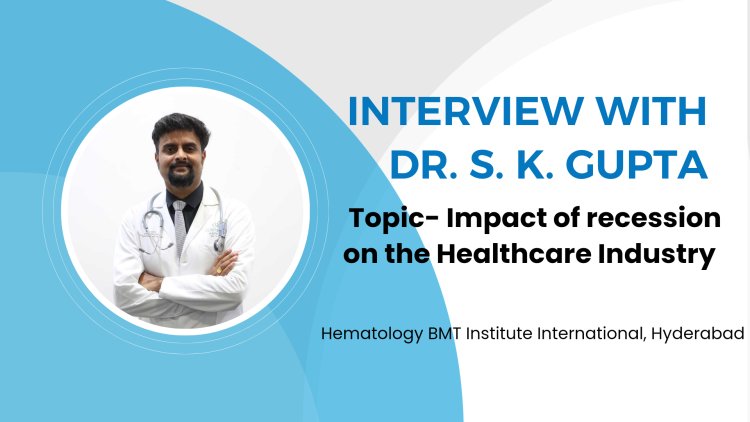Impact of Recession on the Healthcare Industry by Dr S.K. Gupta | Hematology BMT

Introduction
Dr S.K. Gupta is a sought-after speaker and has given numerous lectures on various topics related to hematology. He has recently gained recognition for his insightful views on the impact of recession on the healthcare industry, which you can read further on. He has been invited to several forums and conferences to share his thoughts and answer questions on this topic, displaying his deep understanding and knowledge of the subject matter.
1- What lifestyle changes do we immediately need to adopt to curb the increasing risk of cancer in youth?
Answer: As a healthcare professional, I strongly believe that adopting good living practices is critical to reducing the rising cancer incidence in youngsters. This involves eating a well-balanced diet high in nutrients but low in harmful fats and highly processed. A diet rich in plants and veggies, lean protein, and even whole foods can help lower the risk of various cancers. Physical activity, at a minimum of twenty min each day, can promote a healthier weight and lower your chance of developing certain malignancies. Exercise has been demonstrated to help prevent breast, colorectal, and lung cancers.
As a human being, smoking cigarettes and minimizing second-hand tobacco are also essential for preventing cancer, as tobacco use represents one of the primary cancer-causing factors. It is linked to an increased risk of different kinds of cancer, especially pulmonary, esophagus, genital, as well as kidney cancer. Skin cancer can be prevented by minimizing binge drinking and reducing excess sun exposure. Regular cancer screenings and fast medical assistance for any unexpected symptoms can aid in the early detection of cancer, which is most manageable. It is also critical to keep up with prescribed immunizations, such as HPV, which could also help avoid some malignancies.
2- How can Indian society and the Indian diaspora Collaborate to collectively generate funds for cancer research?
Answer: As a healthcare provider in the Indian community, I believe that the Indian diaspora and Indian society can work together to raise money for cancer research. This can be accomplished using neighborhood charitable events such as benefit marches, fundraisers, and other innovative ideas. Also collaboration with commercial and government groups, as well as enterprises, could also aid in the generation of funding. Furthermore, educational initiatives can promote awareness about the necessity of cancer research funding, motivating individuals to contribute. The Indian society may greatly impact the cancer-fighting effort by banding together.
For example, Indian-American organizations can organize walks and races to promote cancer awareness and support research. Such events are also used to gather the community with each other in support of a collective goal. Furthermore, Indian-American organizations can contribute to cancer research by making direct gifts or helping small fundraisers. The Indian diaspora can make a significant difference in cancer treatment by working together.
3- How will the industry maintain the corporate responsibility fund specially allocated to health care? Is there any slight possibility of cutting in medicines involved in cancer treatment?
Answer- As a healthcare professional, regarding this question I believe the solution would be sustaining corporate citizenship which monies devoted to health care necessitates a focus on prioritizing spending and properly providing funding. Businesses could also research technical approaches to minimize expenses while providing the best possible service to patients. This could entail working on research programs with universities and other public health groups and investing in the creation of expensive cancer drugs. Corporations may show their dedication to social responsibility while simultaneously improving the well-being of their employees and the larger society by prioritizing medical services and participating in disease research.
For example, they can dedicate a percentage of their corporate citizenship funds toward cancer research and initiatives that encourage health. Cancer screenings, awareness programs, and other initiatives aiming at raising knowledge of cancer and its risk factors are examples of such initiatives. Additionally, businesses can work with academic institutions and public health agencies to support research initiatives and contribute to the creation of innovative, affordable cancer treatments. Organizations may have a favorable effect on their staff and the community by displaying their dedication to health and well-being.
4- Is there any need to review the cost-effectiveness of drugs involved in cancer treatment and revisit the R&D policies for Sustainable and cheap cancer drugs?
Answer- As a medical service provider it is important to take in consideration of all the patients which instill their trust in you and understand their situation, in this matter - a reassessment of R&D strategies for sustainable and inexpensive cancer treatments and a study of the expense of cancer treatments is essential in ensuring that patients, irrespective of their financial means, have access to the treatment they require. It is vital to rethink recent drug pricing methods and to establish new approaches that promote accessibility and availability. Furthermore, reevaluating R&D policy for long-term and low-cost cancer treatments will be critical to promoting cost and access. Encouraging pharmaceutical corporations to focus on producing more free but accessible therapies while also funding public health organizations and colleges to implement measures efforts in this area can all help.
For example, the administration could provide tax breaks to medical companies that specialize in creating low-cost cancer medicines. Furthermore, it can contribute to public healthcare systems and colleges to fund research initiatives to develop cost-effective treatment of cancer alternatives. The government can also regulate pharmaceutical costs to guarantee that medicines are approachable and economical for all consumers, whatever their financial capabilities.
It is possible to broaden the availability of cancer therapy and lessen the financial burden on patients and their loved ones by adopting detailed cost and Market research policies. This will ensure that all patients, regardless of their financial circumstances, receive the required services.
5- How will the government be helpful in low-income cases, especially women and physically disabled groups of people?
Answer: As someone who witnesses such cases on a daily basis as a healthcare provider, I believe that administration can assist low-income persons, particularly women and severely disabled people. This might entail sponsoring outreach activities that promote education about the significance of early diagnosis and treatment and offering financial aid for anticancer therapy.
For example, the administration might provide financial support to low-income families to assist them with the costs of cancer, such as hospital stays, prescriptions, and other associated costs. It also can sponsor outreach projects designed to inform women and persons with physical disabilities about the need for frequent breast exams and the options available to them. These programs can assist people in gaining access to health care and enhance their outcomes.
Furthermore, the government can collaborate with Nonprofits, and some other nonprofit groups should provide assistance and information to limited cancer patients. These groups, amongst many other measures, can provide financial aid, transportation, and personal care services to reduce the strain of treating cancer.
The governments can also help improve healthcare systems, particularly in rural and neglected areas. This comprises expanding the number of preventive care clinics and hospitals, training healthcare personnel and supplying required medical items and supplies. These programs can assist in boosting cancer diagnosis and enhance care access for all people, regardless of poverty or social standing.
6- What will be the redressal mechanism for depleting financial resources, especially with informal income with already existing financial status?
Answer: As a medical provider, I firmly believe there must be a grievance redress system when financial resources are depleted, especially for people with sporadic revenue already in a precarious financial situation. This includes financial help for treating cancer and the establishment of social connections for the families of patients.
For example, the authorities could provide financial support to minimal people to assist with the cost of chemotherapy drugs, such as doctor's visits, prescriptions, and other associated costs. It may also create help networks for patients and families, such as counseling and financial aid programs. Several services can assist in lowering the cost of cancer care while also improving the availability of care.
Additionally, private organizations and enterprises can help those who require assistance by providing guidance and assistance. They can, for example, donate to organizations that will provide financial aid for anticancer therapy or allow enterprises that provide help and assistance to patients' families. Functioning together, we can be sure that all clients, regardless of their economic status, are given the treatment they require.

 engame
engame 

















